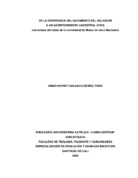Mostrar el registro sencillo del ítem
De la experiencia del nacimiento del salvador a un acontecimiento ancestral afro: una lectura del relato de la comunidad de Mateo en clave liberadora
| dc.contributor.advisor | Céspedes Loaiza, Raúl Darío | |
| dc.creator | Salgado Gómez, Omar Herney | |
| dc.date.accessioned | 2023-04-28T21:11:41Z | |
| dc.date.available | 2023-04-28T21:11:41Z | |
| dc.date.created | 2021 | |
| dc.identifier.uri | http://hdl.handle.net/20.500.12237/2479 | |
| dc.description | La celebración del nacimiento de Jesús, tanto en Belén como en Quinamayo, es un acontecimiento liberador que une y reconcilia a pueblos paganos extranjeros venidos de oriente (reyes magos hacia Belén y esclavos negros del África hacia América) con sus opresores extranjeros (Imperio romano – esclavistas blancos europeos y criollos) teniendo como mediador, al único Dios judeocristiano. Además, une a los pueblos que han sido obligados a vivir la diáspora (Judíos a Babilonia y negros hacia América) abandonando forzosamente sus tierras originarias (Israel y África). Este acontecimiento (nacimiento) se manifiesta en una liberación espiritual que a veces trasciende al campo físico, porque: después de que el niño recibiera adoración de los sabios de oriente, éstos se fugan huyendo del Rey Ilegítimo Herodes regresando a su casa por otro camino; los esclavos negros bailaban (la Juga) en adoración entorno al niño, mientras aprovechaban el tumulto para fugarse, huyendo del esclavista blanco, en búsqueda de la libertad. | spa |
| dc.description.abstract | The celebration of the birth of Jesus, both in Bethlehem and in Quinamayo, is a liberating event that unites and reconciles foreign pagan peoples from the East (wise men to Bethlehem and black slaves from Africa to America) with their foreign oppressors (Roman Empire – white European and Creole slaveholders) having as mediator, the only Judeo-Christian God. In addition, it unites the peoples who have been forced to live in the diaspora (Jews to Babylon and blacks to America) forcibly abandoning their original lands (Israel and Africa). This event (birth) manifests itself in a spiritual liberation that sometimes transcends the physical field, because: after the child received adoration from the wise men from the east, they flee from the Illegitimate King Herod, returning home by another path; the black slaves danced (the Juga) in adoration around the child, while they took advantage of the tumult to escape, fleeing from the white slave owner, in search of freedom. | spa |
| dc.format.mimetype | application/pdf | spa |
| dc.subject | Natividad de Jesús | spa |
| dc.subject | Jesucristo -- Humanidad | spa |
| dc.title | De la experiencia del nacimiento del salvador a un acontecimiento ancestral afro: una lectura del relato de la comunidad de Mateo en clave liberadora | spa |
| dc.subject.subjectenglish | Nativity of jesus | spa |
| dc.subject.subjectenglish | Jesus Christ -- Humanity | spa |
| dc.rights.accessRights | info:eu-repo/semantics/openAccess | spa |
| dc.creator.degree | Especialista en Sagrada Escritura | spa |

